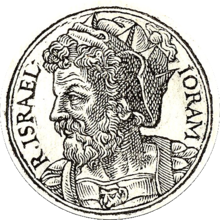Jehoram of Israel
| Jehoram | |
|---|---|
 Jehoram from Guillaume Rouillé's Promptuarii Iconum Insigniorum | |
| King of Israel (Northern Kingdom) | |
| Reign | c. 852 – c. 841 BCE |
| Predecessor | Ahaziah |
| Successor | Jehu |
| Father | Ahab |
| Mother | Jezebel |
Jehoram (Hebrew: יְהוֹרָם Yəhōrām; also Joram) was the ninth king of the northern Kingdom of Israel (2 Kings 8:16, 2 Kings 8:25–28). He was the son of Ahab and Jezebel, and brother to Ahaziah and Athaliah.
According to 2 Kings, 2 Kings 8:16, in the fifth year of Jehoram of Israel, (another) Jehoram became king of Judah. The author of Kings speaks of both Jehoram of Israel and Jehoram of Judah in the same passage.
Biblical narritive
[edit]Jehoram began to reign in Israel in the 18th year of Jehoshaphat of Judah and ruled 12 years (2 Kings 3:1). William F. Albright dated his reign to 849–842 BCE, whereas E. R. Thiele proposed 852–841 BCE.[1]
Unlike his predecessors, Jehoram did not worship Ba'al, and he removed the pillar of Baal,[2] probably a special pillar which Ahab had erected near his palace at Jezreel for his own and Jezebel's worship.[3] However, the writer of 2 Kings says that he still "followed in the ways of Jeroboam, son of Nebat, who led the Israelites to sin". With Jehoshaphat of Judah, Jehoram attacked Mesha, King of the Moabites. In the war between Aram-Damascus and Israel, Elisha befriended Joram, revealing to him the plans of the enemy. Subsequently, when Ben-hadad besieged Samaria, reducing the city almost to starvation and cannibalism, Jehoram sought to behead the prophet. The latter, however, foretold that a period of plenty was imminent; the siege was soon lifted, the city's food supplies were replenished, and the old relation between the king and the prophet was restored.[4]
When Hazael, king of the Arameans, violently revolted in Damascus, as Elisha had predicted (2 Kings 8:12), Jehoram made an alliance with his nephew Ahaziah, King of Judah. The two kings set forth to take Ramoth-Gilead from Aram. The battle failed; Jehoram was wounded in the fighting, and he withdrew to Jezreel to recover. It is likely that his defeat at Ramoth-Gilead was a disaster. As a result, while Jehoram was recuperating at Jezreel, his general, Jehu, incited a revolt. Jehu executed Jehoram by shooting him in the back with an arrow and had his body thrown into the field of Naboth the Jezreelite, as punishment for his parents' sin in illegally stealing Naboth's land. With the death of Jehoram and his other family members, the Omride dynasty came to an end. Jehu claimed the throne of Israel as his own.
Archaeology
[edit]The only time Jehoram is mentioned outside the bible is on the Tel Dan Stele.[5]
The author of the Tel Dan Stele (9th century BCE, found in 1993 and 1994) claimed to have slain both Ahaziah of Judah and Jehoram of Israel. Most scholars identify Hazael of Damascus (c. 842 – 806 BCE) as the author, the Damascan king who fought a great war against Israel and Juda. Apperently the coalition that had been forged between Ahab and Hadadezer, who had provided the main force that stopped the Assyrian king Shalmaneser III at the Battle of Qarqar, had fallen apart under their successors and in the succeeding war between Israel-Juda against Aram-Damascus the kings of Israel and Juda were killed. Jehu, allready an important military leader, then became king after this event.
Two other stone monuments are also relevant to this part of history: Jehu appears on Assyrian Black Obelisk, where he is shown giving tribute to Shalmanes III and is identified as "son of Omri", which woud be a very strange thing to do if he had just exterminated the "House of Omri". It is the first time Omri is ever mentioned by the Assyrians as the founder of the house and so in can not be argued this was allready an established custum and is therfor a very clear indication that Jehu was (or styled himself as) a descendent of Omri.
On the Mesha stele that is dated to ca. 840 BCE, King Mesha of Moab claims an important victory against Israel, after having been oppressed by Omri and his son (not mentioning anyone specifically), retaking several towns and many prisoners of war. The biblical story claims this happened during the short rule of Ahaziah, but this does not match with the claim the lands where held by Israel for forty years (the combinded rule of Omri, Ahab and Ahaziah was only 34 years, with civil wars in the first 4), and a date near the end of the reign of Jehoram would therefor fit much better, both in time and in opportunity (using the war with Hazael as a chance to retake possessions).
References
[edit]- ^ Edwin Thiele, The Mysterious Numbers of the Hebrew Kings, (1st ed.; New York: Macmillan, 1951; 2d ed.; Grand Rapids: Eerdmans, 1965; 3rd ed.; Grand Rapids: Zondervan/Kregel, 1983). ISBN 0-8254-3825-X, 9780825438257
- ^ 2 Kings 3:2
- ^ Cambridge Bible for Schools and Colleges on 2 Kings 3, accessed 20 December 2017
- ^ "Jehoram", Jewish Encyclopedia
- ^ "Biblical Archaeology 4: The Moabite Stone (a.k.a. Mesha Stele)". 15 July 2011.
